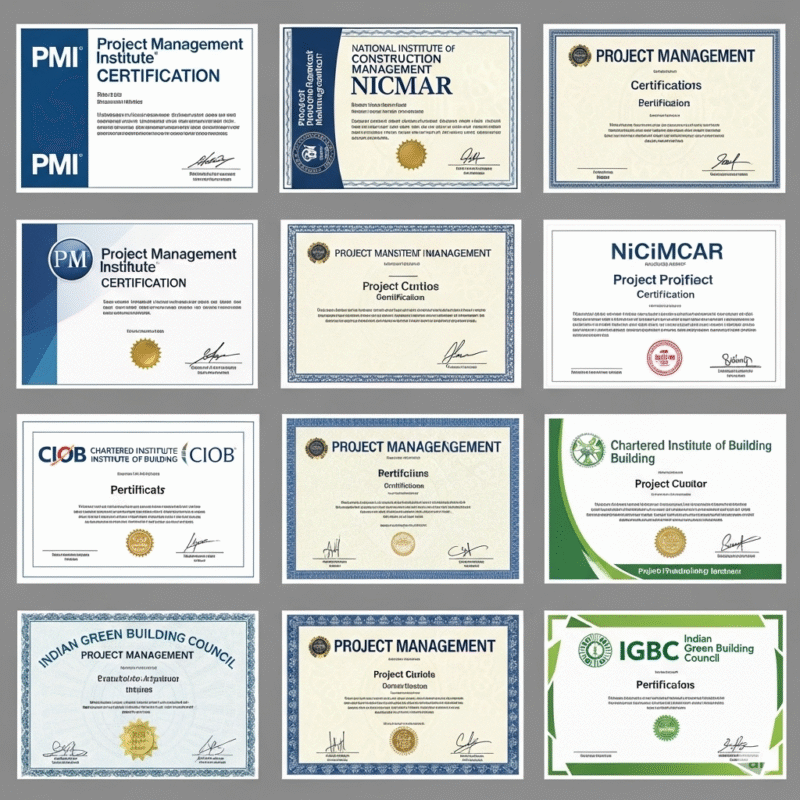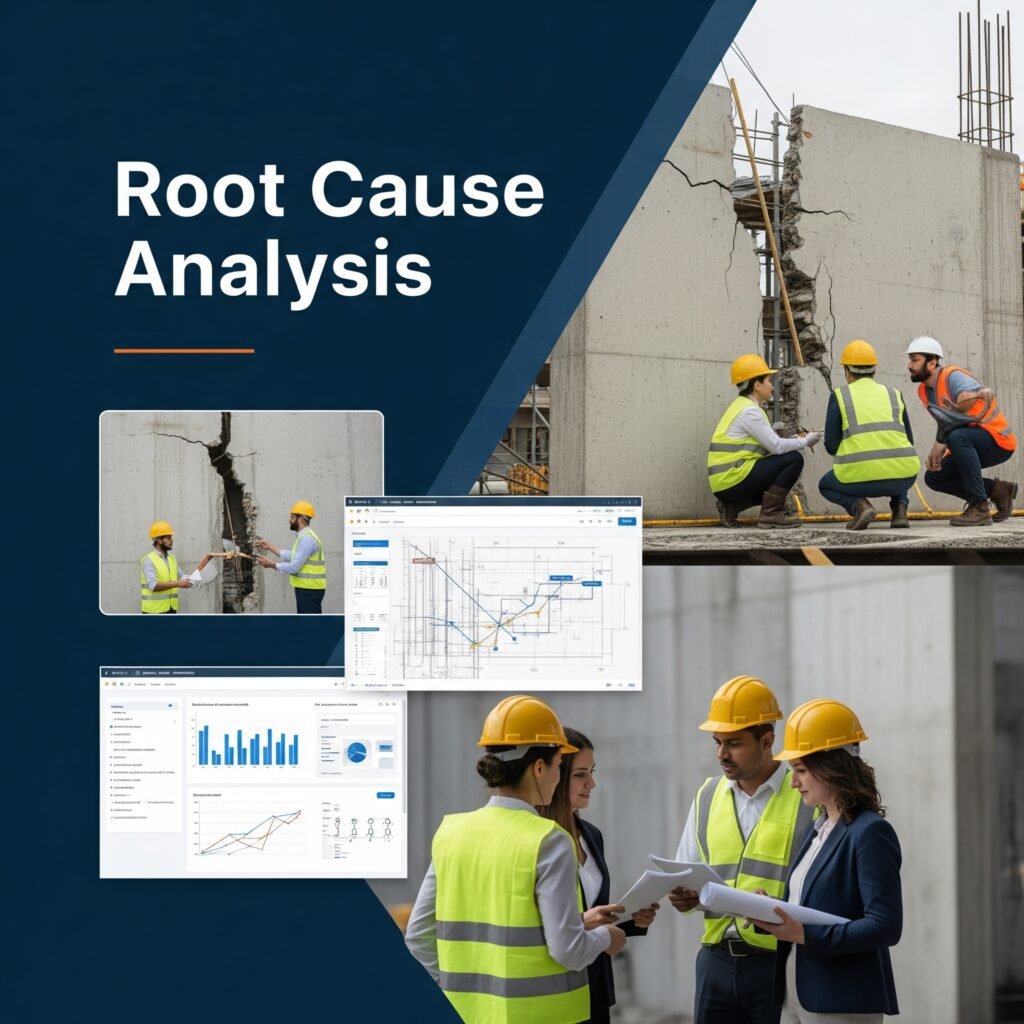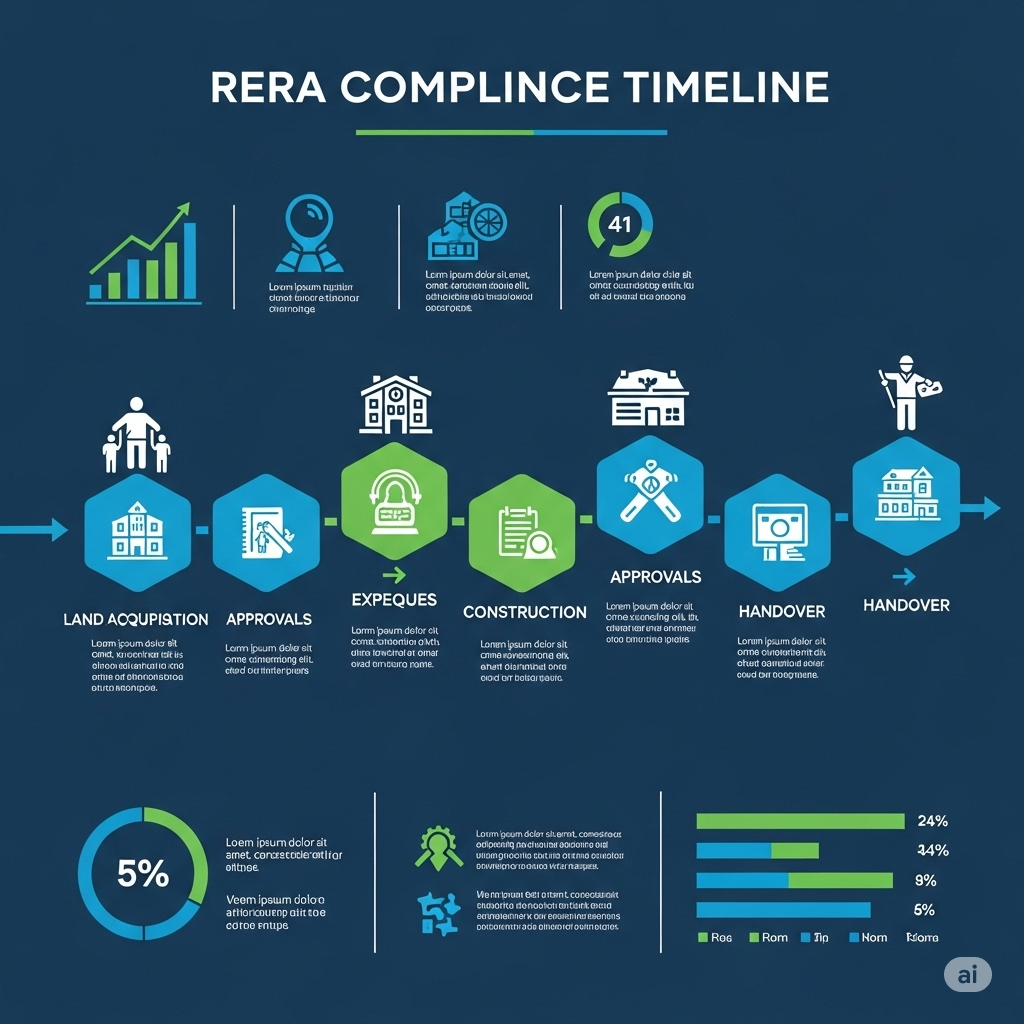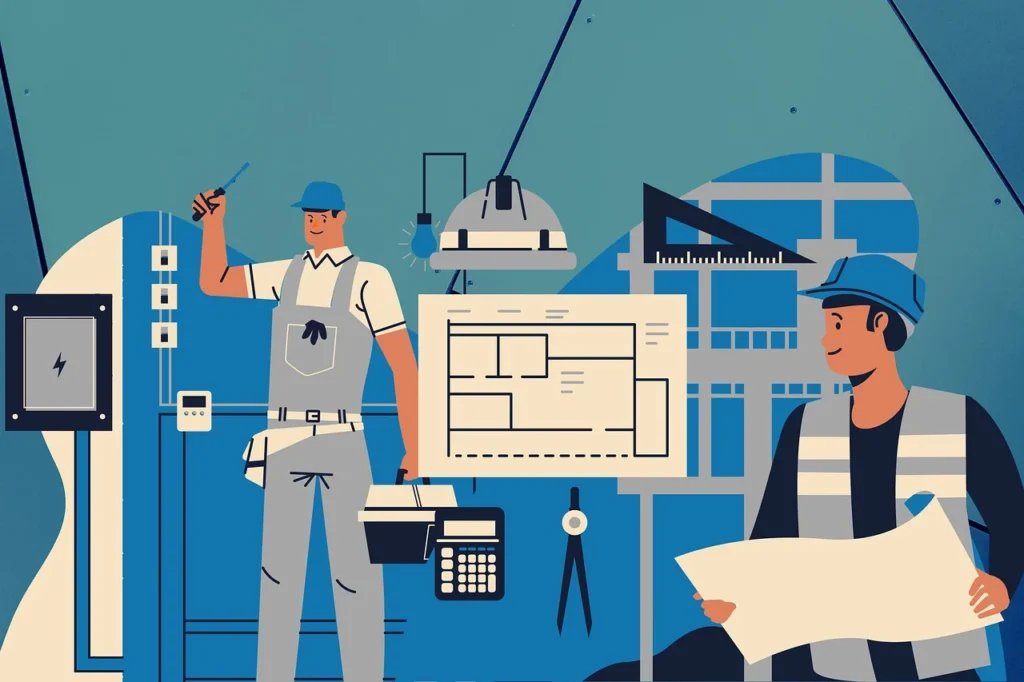Introduction
Construction project management is one of the most rewarding and challenging career paths in the engineering and construction industry. With India’s infrastructure boom and the growing real estate sector, skilled construction project managers are in high demand across residential, commercial, and infrastructure projects.
A construction project manager oversees every aspect of a building project from planning and design to completion and handover. They coordinate between multiple stakeholders, manage budgets, ensure quality standards, and deliver projects on time. This role combines technical expertise with leadership skills, making it an ideal career for those who enjoy problem-solving and working in dynamic environments.
Who Should Read This Guide?
- Fresh engineering graduates looking to enter construction management
- Experienced professionals seeking career transition into project management
- Real estate developers wanting to understand PM roles
- Students working on construction management projects
- Individuals planning to build homes who want to understand the PM process
Key Methodologies & Processes
Step-by-Step Career Development Process
Foundation Building (Years 1-2)
- Educational Qualification: Complete B.Tech in Civil Engineering or Construction Management
- Skill Development: Learn essential software tools (AutoCAD, MS Project, Primavera P6)
- Entry-Level Position: Start as Site Engineer or Planning Engineer
- Industry Exposure: Gain hands-on experience in construction sites
Skill Enhancement (Years 3-5)
- Advanced Certifications: Pursue PMP® or PRINCE2 certification
- Specialized Training: Complete courses from NICMAR or NPTEL
- Software Mastery: Learn BIM tools and advanced project management software
- Leadership Development: Take on team management responsibilities
Career Advancement (Years 5+)
- Management Roles: Move to Project Manager or Construction Manager positions
- Specialization: Focus on specific sectors (residential, infrastructure, commercial)
- International Exposure: Explore opportunities in Gulf countries or Singapore
- Continuous Learning: Stay updated with green construction and AI trends

Industry Standards & Codes
Indian Standards (IS Codes)
- IS 456: Code of practice for plain and reinforced concrete
- IS 800: Code of practice for general construction in steel
- IS 1893: Earthquake resistant design of structures
- IS 3370: Code of practice for concrete structures for storage of liquids
International Standards
- FIDIC contracts for international projects
- PMBOK Guide for project management best practices
- ISO 21500 for project management standards
- OSHA safety standards for construction sites
Material & Manpower Requirements
Essential Materials Knowledge
- Structural Materials: Cement, steel, aggregates, concrete admixtures
- Finishing Materials: Tiles, paints, fixtures, electrical components
- MEP Materials: Pipes, cables, HVAC equipment, plumbing fixtures
- Safety Materials: Helmets, harnesses, safety nets, warning signs
Manpower Planning
- Skilled Labor: Masons, carpenters, steel fixers, welders
- Semi-skilled Labor: Helpers, machine operators
- Supervisory Staff: Site supervisors, quality inspectors, safety officers
- Technical Staff: Engineers, surveyors, CAD operators
Machinery Requirements
- Heavy Equipment: Excavators, cranes, concrete mixers, compactors
- Light Equipment: Drilling machines, cutting tools, measuring instruments
- Transportation: Trucks, dumpers, material handling equipment
- Safety Equipment: Scaffolding, temporary structures, safety barriers
Deliverables at Each Stage
Pre-Construction Phase
Reports & Documents:
- Feasibility study report
- Detailed project report (DPR)
- Environmental impact assessment
- Soil investigation report
- Structural design drawings
- MEP drawings and specifications
Approvals & Certificates:
- Building plan approval
- Environmental clearance
- Fire safety approval
- Structural stability certificate
- Utility connections approval
Impact: Proper pre-construction planning reduces project delays by 30-40% and cost overruns by up to 25%.
Construction Phase
Weekly/Monthly Deliverables:
- Progress reports with S-curve analysis
- Quality control checklists
- Safety inspection reports
- Material consumption reports
- Labor deployment schedules
- Cash flow statements
Quality Control Documents:
- Concrete cube test reports
- Steel test certificates
- Soil compaction test results
- Waterproofing test reports
- Electrical installation certificates
Impact: Regular monitoring and reporting ensure 95% adherence to project schedules and quality standards.
Post-Construction Phase
Final Deliverables:
- Completion certificate
- Occupancy certificate
- Warranty documentation
- As-built drawings
- Operation and maintenance manuals
- Defect liability certificates
Handover Documents:
- Project closeout report
- Lessons learned documentation
- Final cost analysis
- Performance evaluation report
- Client satisfaction survey
Impact: Proper documentation ensures smooth project handover and reduces post-completion disputes by 80%.
Stakeholders & Communication Matrix
Key Players
Primary Stakeholders:
- Client/Owner: Project sponsor and decision maker
- Architect: Design and aesthetic decisions
- Structural Engineer: Safety and structural integrity
- MEP Consultant: Mechanical, electrical, and plumbing systems
- Main Contractor: Overall construction execution
Secondary Stakeholders:
- Subcontractors: Specialized work execution
- Suppliers: Material procurement and delivery
- Government Authorities: Approvals and compliance
- Banks/Financiers: Project funding
- Local Community: Social and environmental impact
Communication Protocols
Daily Communications:
- Site coordination meetings (30 minutes)
- Safety briefings with workers
- Progress updates to supervisors
- Quality control discussions
Weekly Communications:
- Progress review meetings with all stakeholders
- Look-ahead planning sessions
- Resource allocation discussions
- Risk assessment reviews
Monthly Communications:
- Executive summary reports to clients
- Financial performance reviews
- Compliance audit reports
- Stakeholder satisfaction surveys
Communication Tools:
- Project management software (Primavera P6, MS Project)
- Collaboration platforms (Microsoft Teams, Slack)
- Document management systems
- Mobile apps for site reporting
Value Engineering Opportunities
Cost-Saving Techniques
Design Optimization:
- Standardization of structural elements reduces costs by 10-15%
- Modular construction approaches save 20-25% in construction time
- Value engineering workshops identify cost reduction opportunities
- Alternative material analysis for better cost-performance ratio
Construction Methodology:
- Precast concrete elements reduce on-site construction time
- Prefabricated components ensure better quality control
- Lean construction principles eliminate waste
- Just-in-time material delivery reduces storage costs
Sustainable Alternatives
Green Building Materials:
- Fly ash concrete reduces cement consumption by 30%
- Recycled steel saves 15-20% on material costs
- Sustainable timber alternatives (bamboo, engineered wood)
- Low-VOC paints and finishes for better indoor air quality
Energy-Efficient Designs:
- Solar panel integration reduces long-term energy costs
- High-performance insulation materials
- LED lighting systems with smart controls
- Rainwater harvesting systems
- Waste water treatment and recycling
Environmental Benefits:
- LEED certification increases property value by 10-15%
- GRIHA rating ensures compliance with Indian green building standards
- Carbon footprint reduction through sustainable practices
- Waste reduction through recycling and reuse strategies
Case Study: Residential High-Rise Project
Project Overview
Project Name: Prestige Lakeside Towers, Bangalore Project Type: Residential high-rise complex Project Value: ₹250 crores Duration: 36 months Project Manager: Rajesh Kumar, PMP®
Challenges Faced
- Monsoon Delays: Heavy rainfall during construction season
- Material Shortage: Cement and steel price fluctuations
- Regulatory Changes: New fire safety norms during construction
- Labor Shortage: Skilled workers migrating during COVID-19
Solutions Implemented
Weather Management:
- Implemented monsoon-specific construction schedule
- Used weather-resistant materials and protective covers
- Adjusted work shifts to maximize productive hours
Supply Chain Optimization:
- Established long-term contracts with multiple suppliers
- Implemented inventory management system
- Used alternative materials (fly ash concrete, TMT bars)
Compliance Management:
- Conducted regular compliance audits
- Engaged fire safety consultants early
- Retrofitted designs to meet new requirements
Workforce Management:
- Provided on-site accommodation for workers
- Implemented skill development programs
- Established partnerships with labor contractors
Results & Key Takeaways
- Schedule Performance: Completed 2 months ahead of schedule
- Cost Performance: Achieved 8% cost savings through value engineering
- Quality Achievement: Zero major defects, 98% customer satisfaction
- Safety Record: Zero lost-time accidents, 100% safety compliance
Key Lessons Learned:
- Early stakeholder engagement prevents delays
- Flexible planning accommodates unforeseen challenges
- Technology adoption improves efficiency and communication
- Continuous monitoring ensures project success
Risks & Mitigation Strategies
Common Risks in Construction PM
Schedule Risks:
- Weather delays (monsoon, extreme temperatures)
- Material delivery delays
- Labor shortages
- Design changes and rework
Cost Risks:
- Material price fluctuations
- Currency exchange variations (imported materials)
- Scope creep without proper change management
- Hidden site conditions requiring additional work
Quality Risks:
- Poor workmanship due to inadequate supervision
- Material quality issues from unreliable suppliers
- Design errors leading to rework
- Non-compliance with building codes
Safety Risks:
- Accidents due to unsafe working conditions
- Equipment failures and mechanical breakdowns
- Fire hazards from improper storage
- Health risks from hazardous materials
Preventive Measures
Risk Assessment Tools:
- Risk register with probability and impact analysis
- Monte Carlo simulation for schedule and cost risks
- SWOT analysis for strategic planning
- Failure Mode and Effects Analysis (FMEA)
Mitigation Strategies:
- Comprehensive Planning: Detailed work breakdown structure and resource planning
- Contingency Planning: 10-15% buffer for schedule and budget
- Insurance Coverage: Professional indemnity, contractor’s all-risk insurance
- Regular Monitoring: Weekly risk reviews and mitigation plan updates
- Stakeholder Communication: Transparent reporting and early warning systems
Technology Solutions:
- Project management software for real-time tracking
- IoT sensors for equipment monitoring
- Drone surveys for progress monitoring
- AI-powered predictive analytics for risk forecasting
Education & Certification Path
Academic Qualifications
Bachelor’s Degree Options:
- B.Tech in Civil Engineering (preferred)
- B.Tech in Construction Engineering
- Bachelor’s in Construction Management
- B.Arch (for design-focused PM roles)
Master’s Degree Options:
- M.Tech in Construction Management
- MBA in Project Management
- M.Tech in Structural Engineering
- Master’s in Infrastructure Management
Professional Certifications
Project Management Certifications:
- PMP® (Project Management Professional): Global recognition, salary premium of 20-25%
- PRINCE2: Structured approach to project management
- CAPM: Entry-level certification for beginners
- PMI-ACP: Agile project management certification
Construction-Specific Certifications:
- NICMAR Programs: Postgraduate programs in construction management
- CIOB (Chartered Institute of Building): International construction management qualification
- RICS (Royal Institution of Chartered Surveyors): Property and construction standards
Short-Term Courses & Online Learning
Technical Skills Courses:
- NPTEL’s “Construction Project Management” (free online course)
- Primavera P6 certification programs
- BIM training (Revit, Navisworks, Tekla)
- AutoCAD for construction drawings
Software Skills Training:
- MS Project for project planning
- Excel for data analysis and reporting
- PowerBI for project dashboards
- SAP for enterprise resource planning
Entry-Level Roles to Target
Site Engineer (₹3-5 LPA)
Responsibilities:
- Day-to-day site supervision and quality control
- Material management and labor coordination
- Progress monitoring and reporting
- Safety compliance and documentation
Key Employers:
- L&T Construction
- Shapoorji Pallonji Group
- Godrej Properties
- Prestige Group
Planning Engineer (₹4-6 LPA)
Responsibilities:
- Project scheduling using Primavera P6
- Resource planning and allocation
- Progress tracking and variance analysis
- Coordination with project teams
Skills Required:
- Proficiency in scheduling software
- Understanding of construction sequences
- Analytical and problem-solving skills
- Communication and coordination abilities
Quality Control Inspector (₹3-4 LPA)
Responsibilities:
- IS code compliance verification
- Material testing and inspection
- Quality documentation and reporting
- Coordination with testing laboratories
Career Growth:
- Quality Manager (₹8-12 LPA)
- QA/QC Head (₹15-20 LPA)
- Technical Director (₹25+ LPA)
Must-Have Technical Skills
Drawing Reading & Interpretation
Architectural Drawings:
- Floor plans, elevations, sections
- Detail drawings and specifications
- Door and window schedules
- Finish schedules and material specifications
Structural Drawings:
- Foundation plans and details
- Reinforcement drawings
- Structural sections and elevations
- Connection details and specifications
MEP Drawings:
- Electrical single-line diagrams
- Plumbing and drainage layouts
- HVAC ductwork and equipment layouts
- Fire fighting system drawings
BOQ Preparation & Cost Estimation
Quantity Surveying Skills:
- Material quantity calculations from drawings
- Labor productivity analysis
- Equipment cost estimation
- Overhead and profit calculations
Software Tools:
- Excel for quantity calculations
- Candy software for BOQ preparation
- Rate analysis software
- Cost estimation applications
Contract Management
Contract Types:
- EPC (Engineering, Procurement, Construction): Turnkey project delivery
- FIDIC Contracts: International construction contracts
- Item Rate Contracts: Payment based on quantity executed
- Lump Sum Contracts: Fixed price project delivery
Key Contract Clauses:
- Scope of work and specifications
- Payment terms and milestones
- Variation and change order procedures
- Penalty and bonus clauses
- Force majeure and termination clauses
Soft Skills Development
Leadership Skills
Team Management:
- Leading diverse teams of engineers, supervisors, and workers
- Motivating teams during challenging project phases
- Conflict resolution and problem-solving
- Performance management and feedback
Communication Skills:
- Presenting project updates to senior management
- Negotiating with suppliers and subcontractors
- Client relationship management
- Cross-cultural communication in international projects
Negotiation Skills
Vendor Negotiations:
- Material procurement and pricing
- Service contracts and terms
- Quality standards and delivery schedules
- Payment terms and conditions
Client Negotiations:
- Scope changes and variations
- Project timeline adjustments
- Cost escalations and approvals
- Change order negotiations
Crisis Management
Common Crisis Situations:
- Natural disasters (earthquakes, floods, cyclones)
- Accidents and safety incidents
- Material shortages and supply chain disruptions
- Labor strikes and industrial disputes
- Design errors and construction defects
Crisis Response Framework:
- Emergency response procedures
- Communication protocols
- Resource mobilization
- Stakeholder management
- Recovery and continuation planning
Gain Practical Experience
Internship Opportunities
PMC (Project Management Consultancy) Firms:
- Turner & Townsend: International PMC with Indian operations
- Currie & Brown: Cost management and project management
- EC Harris (Arcadis): Infrastructure and building projects
- Faithful+Gould: Technical and commercial project management
Construction Companies:
- L&T Construction: Infrastructure and building projects
- Afcons Infrastructure: Heavy civil construction
- Simplex Infrastructures: Urban infrastructure projects
- Voltas: Building and HVAC projects
Freelance Project Opportunities
Small Residential Projects:
- Individual house construction supervision
- Renovation and interior projects
- Site supervision for small developers
- Quality control services
Portfolio Building:
- Document project progress with photos
- Prepare case studies of completed projects
- Develop client testimonials
- Create project management templates
Volunteer Work
NGO Infrastructure Projects:
- School building construction projects
- Community center development
- Water supply and sanitation projects
- Disaster relief construction activities
Benefits:
- Social impact and community contribution
- Networking with like-minded professionals
- Experience in resource-constrained environments
- Leadership development opportunities
Networking & Mentorship
Professional Bodies
CIOB (Chartered Institute of Building):
- Student membership: ₹2,000/year
- Professional development courses
- Networking events and conferences
- International career opportunities
PMI India Chapter:
- PMP certification support
- Local chapter meetings
- Professional development units (PDUs)
- Career development resources
Institution of Engineers (India):
- Technical seminars and workshops
- Industry networking events
- Continuing education programs
- Professional recognition
LinkedIn Networking Strategy
Profile Optimization:
- Professional headline and summary
- Construction project management keywords
- Portfolio of completed projects
- Skills endorsements and recommendations
Networking Approach:
- Connect with senior project managers
- Engage with industry content and discussions
- Share project insights and learnings
- Participate in construction management groups
Industry Events & Conferences
Major Construction Events:
- ACE Tech: Architecture, construction, and engineering exhibition
- India Construction Festival: Annual construction industry gathering
- Big 5 Construct India: International construction trade fair
- Smart Cities India: Urban infrastructure and technology
Benefits of Attendance:
- Learn about latest industry trends
- Network with industry professionals
- Discover new technologies and solutions
- Explore career opportunities
Career Growth Pathways
Residential Construction
Project Types:
- High-rise residential towers
- Gated community developments
- Affordable housing projects
- Luxury villa developments
Career Progression:
- Site Engineer → Project Engineer → Project Manager → General Manager
- Salary Growth: ₹3 LPA → ₹18 LPA → ₹35 LPA (8-10 years)
Key Employers:
- Godrej Properties, Prestige Group, Brigade Group, Sobha Limited
Infrastructure Projects
Project Types:
- Highway and expressway construction
- Metro rail and transportation projects
- Airports and port development
- Water treatment and distribution systems
Career Progression:
- Planning Engineer → Project Manager → Program Manager → Business Head
- Salary Growth: ₹4 LPA → ₹22 LPA → ₹45 LPA (10-12 years)
Key Employers:
- L&T, Afcons, IRB Infrastructure, GMR Group
International Opportunities
Popular Destinations:
- Gulf Countries: UAE, Saudi Arabia, Qatar, Kuwait
- Southeast Asia: Singapore, Malaysia, Philippines
- Africa: Nigeria, Tanzania, Kenya
- Australia: Infrastructure and mining projects
Salary Premiums:
- Gulf: 150-200% of Indian salaries (tax-free)
- Singapore: 200-250% of Indian salaries
- Australia: 300-400% of Indian salaries
Requirements:
- 5+ years of experience in India
- PMP or equivalent international certification
- English proficiency (IELTS for some countries)
- Willingness to relocate and adapt
Salary Expectations (2025)
Fresher Level (0-2 years)
Site Engineer: ₹3-6 LPA
- Companies: L&T, Shapoorji Pallonji, Godrej Properties
- Location impact: Metro cities offer 20-30% premium
- Skills premium: AutoCAD, Primavera P6 knowledge adds ₹0.5-1 LPA
Planning Engineer: ₹4-7 LPA
- Companies: PMC firms, infrastructure companies
- Software skills: Primavera P6 expertise essential
- Growth potential: 25-30% annual increments
Mid-Level (3-7 years)
Project Manager: ₹10-18 LPA
- Companies: Major developers, construction companies
- Certification premium: PMP adds 15-20% to salary
- Project size impact: Large projects (₹100+ crores) offer higher packages
Construction Manager: ₹12-20 LPA
- Companies: International contractors, large developers
- International exposure: Adds 30-40% premium
- Specialization: Infrastructure projects pay 20% more than residential
Senior Level (8-15 years)
General Manager – Projects: ₹20-35 LPA
- Companies: Listed developers, multinational contractors
- P&L responsibility: Significant impact on compensation
- Performance bonuses: 20-50% of base salary possible
Construction Head: ₹25-50 LPA
- Companies: Large construction companies, real estate developers
- Equity participation: Stock options in listed companies
- International assignments: 100-150% salary premium
Factors Affecting Salary
Location Premium:
- Mumbai/Delhi NCR: 30-40% higher than other cities
- Bangalore/Hyderabad: 20-25% higher than tier-2 cities
- Pune/Chennai: 15-20% higher than tier-2 cities
Company Type Premium:
- MNCs: 25-35% higher than Indian companies
- Listed companies: 15-25% higher than private companies
- PMC firms: 20-30% higher for similar roles
Skill Premium:
- PMP certification: 15-25% salary increase
- International experience: 30-50% premium
- BIM expertise: 10-20% additional compensation
- Multiple language skills: 5-15% premium
Future Trends to Master
BIM (Building Information Modeling)
4D Modeling (Time):
- Construction sequencing and scheduling
- Clash detection and resolution
- Progress monitoring and visualization
- Resource planning and optimization
5D Modeling (Cost):
- Real-time cost tracking and analysis
- Quantity takeoff automation
- Budget variance analysis
- Life-cycle cost modeling
Career Impact:
- BIM managers earn 25-30% more than traditional PMs
- International opportunities increase significantly
- Technology leadership roles become accessible
Green Construction & Sustainability
LEED Certification:
- Leadership in Energy and Environmental Design
- Green building design and construction
- Sustainable material selection
- Energy efficiency optimization
GRIHA Certification:
- Green Rating for Integrated Habitat Assessment
- Indian green building rating system
- Climate-responsive design
- Water and waste management
Market Demand:
- 40% of new commercial projects require green certification
- Green building PMs earn 15-20% premium
- Government mandates driving adoption
AI and Digital Technologies
Predictive Analytics:
- Schedule risk prediction
- Cost overrun forecasting
- Quality issue identification
- Resource optimization
IoT and Smart Construction:
- Real-time equipment monitoring
- Worker safety tracking
- Environmental condition monitoring
- Automated progress reporting
Drone Technology:
- Site surveying and mapping
- Progress monitoring
- Safety inspections
- Quality control
Career Preparation:
- Learn data analysis and visualization
- Understand AI applications in construction
- Develop digital literacy skills
- Stay updated with emerging technologies
Conclusion & Further Reading
Starting a career in construction project management requires a combination of technical knowledge, practical experience, and continuous learning. The construction industry offers excellent growth opportunities, with the potential to work on diverse projects ranging from residential complexes to major infrastructure developments.
Key Success Factors:
- Strong educational foundation in civil engineering or construction management
- Continuous skill development through certifications and training
- Practical experience through internships and entry-level positions
- Professional networking and mentorship
- Adaptability to new technologies and industry trends
Immediate Action Steps:
- Assess your current qualifications and identify skill gaps
- Enroll in relevant certification programs (PMP, NICMAR)
- Gain hands-on experience through internships or entry-level roles
- Build a professional network through industry associations
- Stay updated with industry trends and emerging technologies
The construction project management field is evolving rapidly with new technologies, sustainability requirements, and changing market demands. Success in this field requires a commitment to lifelong learning and adaptation to industry changes.
External Resources
- Project Management Institute (PMI)
- National Institute of Construction Management (NICMAR)
- Chartered Institute of Building (CIOB)
- Indian Green Building Council (IGBC)




